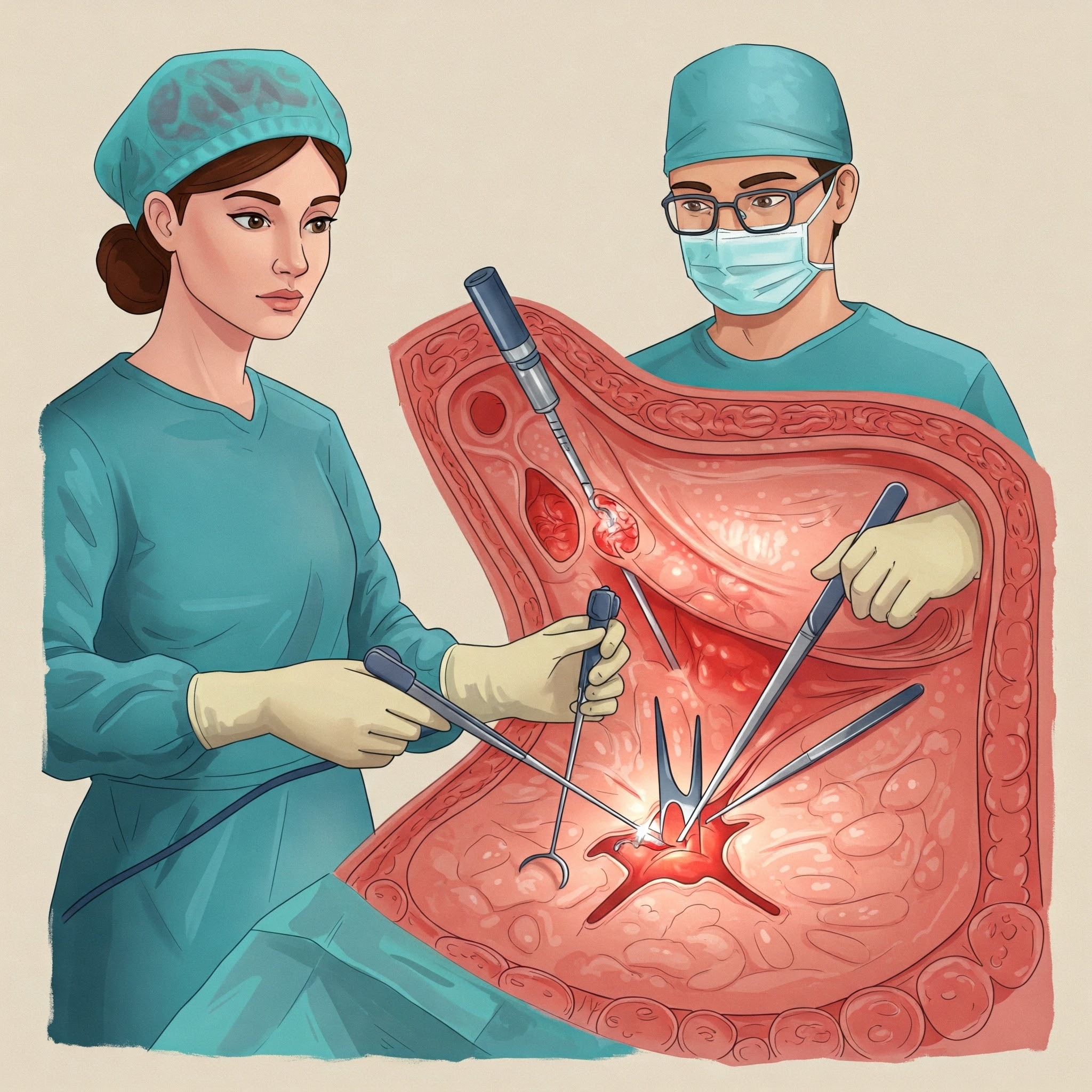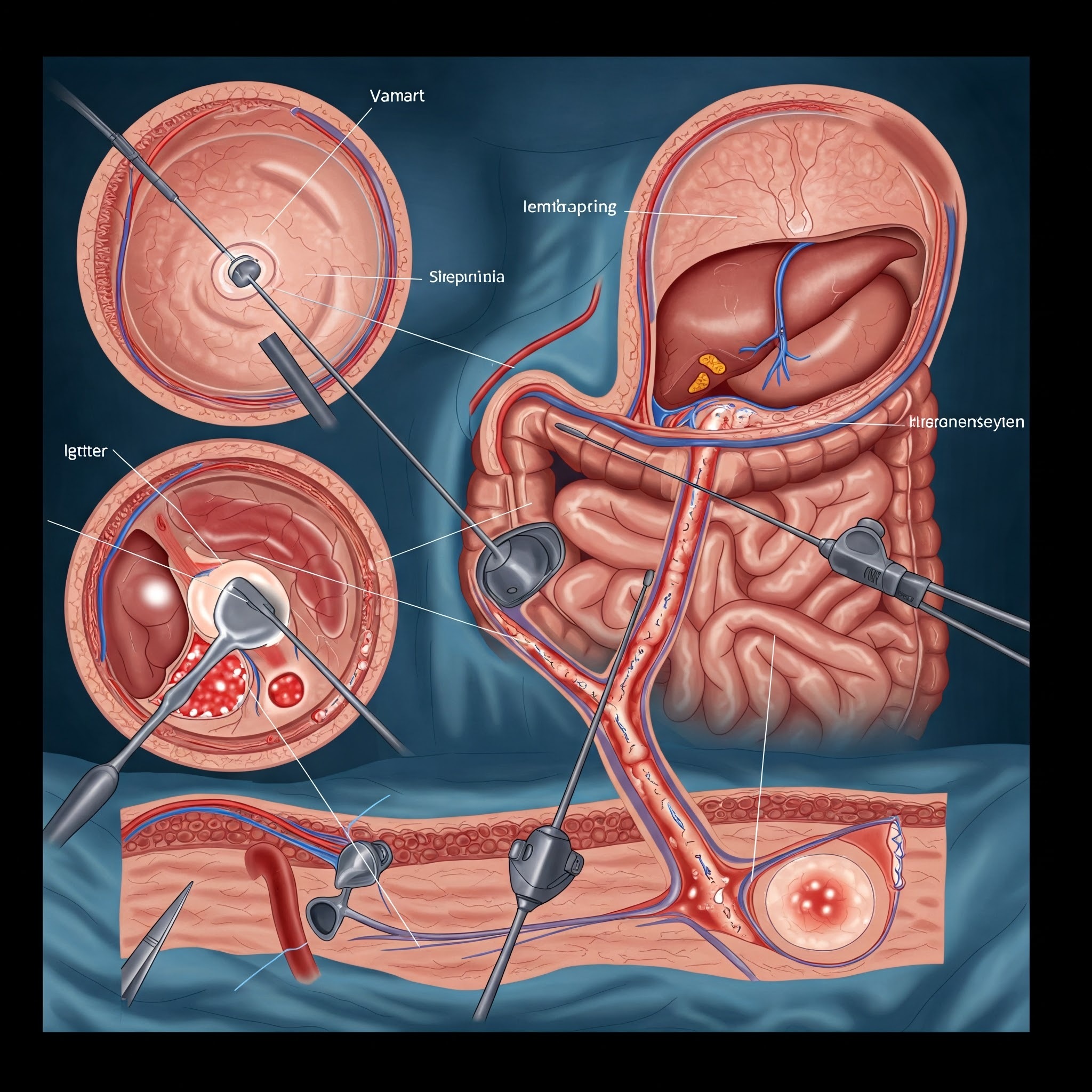Restore your health with advanced laparoscopic hernia surgery
Minimally invasive solutions for lasting relief
At Neo-Woman, we specialize in advanced laparoscopic hernia repair surgery, offering a safe, effective, and minimally invasive solution for hernia treatment. Our skilled surgeons use keyhole surgery techniques, which require only a few small incisions, reducing post-operative discomfort and promoting faster recovery compared to traditional methods.
The laparoscopic hernia surgery procedure involves inserting a tiny camera and surgical instruments through these small incisions to repair the weakened abdominal tissue. A laparoscopic hernia repair mesh is used to strengthen the area and prevent recurrence. This procedure is typically performed under general anaesthetic, ensuring patient comfort throughout.
Our patients benefit from significantly shorter laparoscopic hernia surgery recovery time, allowing them to resume their daily activities more quickly. We provide comprehensive post-operative care, including personalized recovery plans and guidance on activity resumption.
If you’re searching for hernia surgery near me or considering laparoscopic hernia surgery in Pune, Neo-Woman offers expert care with state-of-the-art facilities. Trust us to help you reclaim your health with precision, care, and compassion.


Laparoscopic hernia surgery: effective repair with small incisions
Our Laparoscopic Hernia Surgery service focuses on repairing hernias using minimally invasive techniques. Through small incisions, our experienced surgeons insert a laparoscope to repair the affected area with a durable mesh. This method results in less discomfort, minimal scarring, and faster recovery compared to traditional hernia surgery.
- Understanding hernias: causes, symptoms, and treatment options
Hernias occur when an organ or tissue pushes through a weak spot in the surrounding muscle or connective tissue. Common causes include heavy lifting, persistent coughing, obesity, or pregnancy. Symptoms often involve visible swelling, pain during physical activity, or a feeling of pressure in the affected area. Early diagnosis is crucial to prevent complications. Laparoscopic hernia repair surgery is a minimally invasive approach that provides effective treatment with shorter recovery times compared to traditional surgery. If you notice persistent pain or a bulge in your abdomen or groin, consulting a specialist promptly can prevent further complications. Understanding these factors can help patients make informed decisions regarding treatment.
Here are some of the check up and health screenings that you should get done:
- Pelvic Exam
- Pap Smear (Cervical Cancer Screening)
- Breast Exam
- Blood Pressure Measurement
- Cholesterol Screening
- Bone Density Scan (DXA)
- Blood Sugar Test (Glucose Screening)
- Thyroid Function Tests
- Blood Count (Complete Blood Count, CBC)
* The specific exams and screenings recommended can vary based on a woman’s age, family history, personal health history, and risk factors. It’s essential to discuss your individual healthcare needs and screening schedule with your healthcare provider.
- What makes laparoscopic hernia repair a preferred choice?
Laparoscopic hernia repair is often the preferred choice due to its less invasive nature and quicker recovery period. This procedure involves making a small incision and inserting a laparoscope—a thin tube with a camera—to guide the repair process. Unlike open surgery, laparoscopic techniques cause less post-operative pain, reduce the risk of infection, and result in minimal scarring. Additionally, the laparoscopic hernia repair mesh provides durable support to the weakened tissue, significantly lowering the chance of recurrence. For many patients, this procedure allows a quicker return to daily activities and improved overall outcomes.
- Recovery timeline after hernia surgery: tips for faster healing
The laparoscopic hernia surgery recovery time typically ranges from two to four weeks, depending on the patient’s overall health and the hernia’s severity. Immediately after surgery, patients may experience mild discomfort, swelling, or bruising around the surgical site. Following the surgeon’s instructions is crucial for optimal healing. Key recovery tips include avoiding heavy lifting, maintaining a nutritious diet, and performing light activities to promote circulation. Patients are also advised to watch for signs of infection, such as increased pain, redness, or discharge. With proper post-operative care, most individuals can resume regular activities sooner compared to traditional open hernia repair methods.
- Hernias in women: risk factors and surgical treatments
While hernias are more commonly associated with men, women can also be significantly affected.
Factors like pregnancy, chronic coughing, or heavy lifting contribute to the risk. Symptoms may be less obvious in women, often leading to delayed diagnosis and treatment. Laparoscopic hernia surgery in Pune offers a reliable solution for hernia management, especially for female patients experiencing persistent pelvic pain or discomfort. The procedure, performed under general anaesthetic, ensures minimal scarring and faster recovery. Raising awareness about hernia risks in women and encouraging timely medical consultation can help improve outcomes.
- Laparoscopic vs. Traditional hernia repair: which one should you choose?
Choosing between laparoscopic and open hernia repair depends on various factors, including hernia type, size, and patient health. Laparoscopic hernia repair surgery uses small incisions and advanced instruments, resulting in less pain and quicker recovery. On the other hand, open surgery may be necessary for larger or more complex hernias. Patients searching for hernia surgery near me should consult experienced surgeons to discuss the best option for their condition. The advantages of laparoscopic approach, such as reduced infection risk and shorter hospital stays, make it an increasingly popular choice for many patients.

Frequently asked questions
What are the signs of a hernia?
Symptoms include a noticeable lump, pain when lifting, or discomfort in the groin or abdomen.
What is laparoscopic hernia repair surgery?
It’s a minimally invasive procedure using a small incision, camera, and mesh to reinforce the weakened area.
How long does it take to recover from hernia surgery?
Recovery typically takes 2-4 weeks for light activities and 6-8 weeks for strenuous tasks.
Is laparoscopic hernia surgery safe?
Yes, it’s a safe and effective procedure with fewer complications compared to open surgery.
Will the hernia come back after surgery?
Recurrence is uncommon when mesh reinforcement is used, but maintaining a healthy lifestyle helps reduce the risk.
Disclaimer: Results and patient experiences may vary. These are dependent on a number of factors including age, medical history, lifestyle and more.
